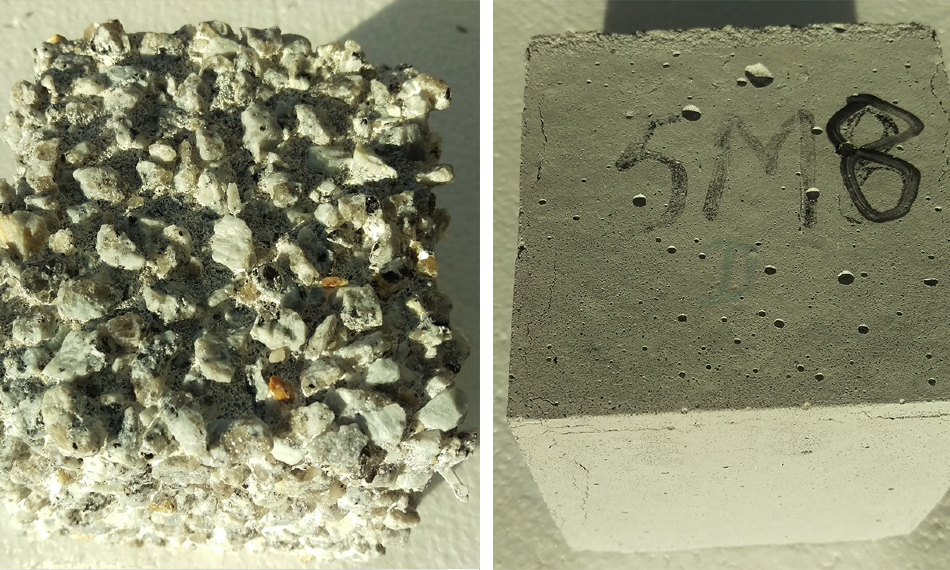Sep 29 2020
Globally, concrete corrosion and fatbergs have a major impact on sewage systems, leading to expensive and disruptive maintenance.
 Left: Highly corroded ordinary Portland cement concrete. Right: Zero cement concrete. Image Credit: RMIT University.
Left: Highly corroded ordinary Portland cement concrete. Right: Zero cement concrete. Image Credit: RMIT University.
Engineers from RMIT University have created concrete that can endure the corrosive acidic environment common in sewage pipes, while significantly decreasing residual lime that leaches out, adding to fatbergs.
Fatbergs are lumps of solid mass that clog sewers with oil, fat, grease, and non-biodegradable junk such as nappies and wet wipes, with some growing to be 200 m in length and weighing tons.
Billion-Dollar Savings
These accumulations of oil, fat, and grease in pipelines and sewers, coupled with general corrosion over time, cost billions in terms of repairs and replacement of pipes.
The RMIT team, headed by Dr Rajeev Roychand, developed concrete that removes a chemical element—free lime—that supports fatbergs and corrosion.
According to Dr Roychand, the solution is more long-lasting when compared to standard Portland cement, rendering it ideal for use in key infrastructure, such as sewage drainage pipes.
The world’s concrete sewage pipes have suffered durability issues for too long. Until now, there was a large research gap in developing eco-friendly material to protect sewers from corrosion and fatbergs. But we’ve created concrete that’s protective, strong, and environmental—the perfect trio.
Dr Rajeev Roychand, Study Lead and Engineer, RMIT University
The Perfect Blend
By-products of the manufacturing sector are the main ingredients of the cement-less concrete—a zero cement composite of slag, fly-ash, nano-silica, and hydrated lime.
Besides using large volumes of industrial by-products, promoting a circular economy, the researchers’ concrete exceeds sewage pipe strength standards fixed by ASTM International.
Though ordinary Portland cement is widely used in the fast-paced construction industry, it poses long term durability issues in some of its applications. We found making concrete out of this composite blend—rather than cement—significantly improved longevity.
Dr Rajeev Roychand, Study Lead and Engineer, RMIT University
Sustainable Benefits
Substituting underground concrete pipes is a laborious operation; digging up the ground is costly and usually has a ripple effect of extended traffic delays and neighborhood disturbances.
According to the Water Services Association of Australia, sewage network maintenance costs are estimated to cost $15 million annually and billions globally.
The environmental cost is bigger—standard Portland cement contributes to roughly 5% of the greenhouse gas emissions in the world.
But the RMIT research has shown that certain by-products can resolve the issue, substituting cement and capable of enduring the high acidity of sewage pipes.
Our zero-cement concrete achieves multiple benefits: it’s environmentally friendly, reduces concrete corrosion by 96% and totally eliminates residual lime that is instrumental in the formation of fatbergs. With further development, our zero-cement concrete could be made totally resistant to acid corrosion.
Dr Rajeev Roychand, Study Lead and Engineer, RMIT University
Going forward, Roychand and his team are seeking to partner with the government and manufacturers to put their zero-cement concrete to further use.
What is a Fatberg?
Video Credit: RMIT University.
Journal Reference
Roychand, R., et al. (2020) Development of zero cement composite for the protection of concrete sewage pipes from corrosion and fatbergs. Resources, Conservation & Recycling. doi.org/10.1016/j.resconrec.2020.105166.